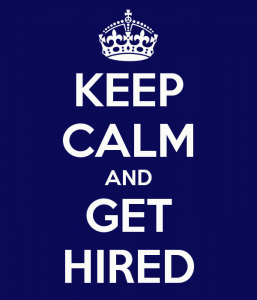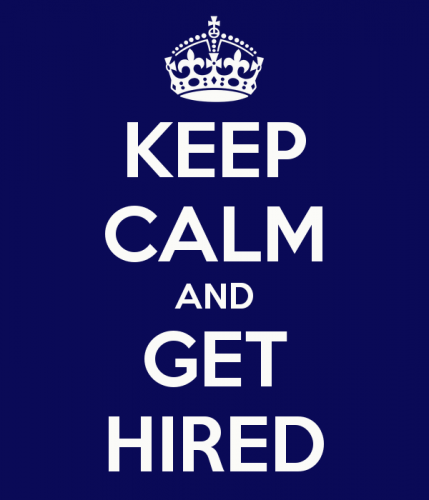A Geospatial Manager’s Perspective: 20 Tips for the Successful GIS Job Seeker
Recently graduated? Starting out in your geomatics career? Here is a view from the other side.
For the past 10 years or so, I’ve been in a position where I’ve had the privilege and opportunity to hire and manage staff. I’ve worked in the geomatics field for over 20 years in both the public and the private sector. I’ve learned a few things along the way that you might find worth considering as you go about applying for jobs and attending interviews. Some of my thoughts might come off sounding a bit harsh. I do understand that, behind every résumé is a person who is looking for a new opportunity in their career and/or simply looking for a job to make ends meet. And as someone who hires people I get all sorts of applicants, many good and many not so good. These thoughts are only meant to make both of our jobs easier. 
- It might be personal to you but it isn’t to me. Over the past 18 months I’ve reviewed about 400 résumés and each one represents a person with hopes of getting a job that will support them and/or making that next step in their geomatics career. Everyone, in their mind, has a good reason to get the job. But I’m just looking for a great candidate that can do the job and fit in with the rest of the team. Your reasons for getting the job are very different from my reasons for giving you the job.
- I might not necessarily hire the best candidate. Whatever that may mean, I’m looking for a candidate that will be good enough, both technically and personally. The winning candidate might not be the smartest or know the most but might have a great attitude and a personable nature. Both of these items are important. With the right attitude, anything can be learned. And with the right personality, the candidate will be able to integrate well with the rest of my already excellent team.
- Read the job description carefully. Use the job description as a guideline to writing your cover letter (more on that below) and your résumé. Take note of what is being looked for and emphasized. A job that has the same title as another job in another company might mean something entirely different.
- Use the cover letter to tell me how you meet the job requirements. This doesn’t simply mean a rehashing of your work experience and educational achievements. Look at the job requirements and list how you meet those requirements. The best cover letter I came across was one where the candidate laid out the job requirements in one side of a table and how she fulfilled those requirements on the other. It made it very easy for me to see that she was a candidate who met all the requirements. She got an interview and the job.
- Keep the cover letter to one page. If I have 100 applicants to go through, I’m not likely to read any cover letter that’s more than a page long.
- Read the job description again. And pay attention to any specific requirements on how to apply for the job. This tells me how well you pay attention to details and how much effort you put into things.

- Your résumé should not be longer than 2 pages. This is especially true if you are a recent graduate and don’t have a lot of geomatics experience. There’s no need to list all those after-school part-time jobs you had in high school. If you feel the need to include these jobs, one line summaries would probably suffice.
- Customize your résumé for the job. Yes, you’re probably applying for numerous geomatics jobs and they may all require pretty much the same thing but there are differences (see #3). You don’t have to have an entirely different résumé for each job that you apply for but take the time to reorder and emphasize different things, depending on the job requirements.
- Your résumé will get you an interview, not the job. Your résumé should highlight your relevant education, skills and experience. These are all important aspects to getting the job. But the one thing your résumé might have trouble doing is showing your personality and style. That’s what the interview is for. I select candidates to interview based on their résumé. I select candidates to hire based on their interview.
- Tone down your use of adjectives. Telling me that you have “abundant, advanced, complete, comprehensive, extensive, practical” or (my favourite) “superior” knowledge is a bit of an overkill. It’s enough for me to say that you’re knowledgeable in a certain area.
- Don’t be put off by an unresponsive interviewer. Interviewers have different styles. Some like to run the interview more as a conversation. Others prefer the straight question-and-answer approach. Some might seem cold and aloof. Others will appear friendly. Be prepared for any of these in your interview. And don’t take their response (or lack of response) personally.
- Private and public sector interviews are a bit different. There is alot more flexibility in the private sector for an employer to hire someone whose personality they like. In the public sector, to avoid any display of favouritsm, this is harder to do and the emphasis is more on how you answer the questions that are asked.
- You’re going to be nervous. That’s to be expected. Be aware of what you do when you are nervous and try to keep it under control.
- Think beyond your initial answer. Sometimes there is more than one answer to a question. The answer you give may be right but it might only be half of the answer I’m looking for.
- It’s ok to say you don’t know the answer to a question. Everyone will have gaps in their knowledge and I’d rather hear someone say they don’t know than give a completely guessed at response. In fact, it takes courage to say you don’t know the answer. Some questions might be purposefully difficult and impossible to answer just to see how you respond. However, keep in mind that if you didn’t have an answer to a lot of the questions, I’d probably begin wondering if you knew enough.

- Do your research. The Internet will often have some information on the company or project you’ll be working on so take the time before the interview to do your research. I always like to ask candidates what they know about the work that we do. Just knowing that might not get you the job but it does tell me that you are keenly interested in it and will work to learn more about it. As well, if you have contacts within a company or even someone who is working a similar job, use them to learn as much as you can.
- Geomatics is a technical field so expect to be asked technical questions. This is where doing your research (#16) will help you in narrowing down the types of questions that will be asked. Knowing what we do, for instance, will explain why I ask the questions I do.
- Just because you’ve done the job before doesn’t mean you’ll be the one who is hired. Never assume that. If that were the case, I probably wouldn’t be doing interviews and would just hire you immediately.
- Be patient. I know that you want to hear one way or the other if you got the job. Usually a decision is made pretty soon after the interviews are completed but making a job offer to someone gets held up in HR paperwork. So be patient and try not to fret too much. Not only that, sometimes weeks down the road another opening may come up. Instead of doing another round of interviews, an employer might just take the next top candidate. Yes, that doesn’t happen too often – but it does happen sometimes!
- Don’t be afraid to ask for feedback. Ask the employer for feedback on your résumé and cover letter if you didn’t get an interview or on your interview if you didn’t get the job. At worst, you may not get a response. At best, you may get some worthwhile tips that could improve your chances on the next job. Less than 1% of people (in my experience) have asked for feedback.








